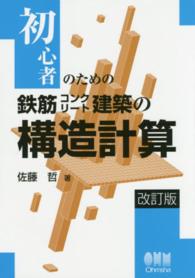- ホーム
- > 洋書
- > 英文書
- > Religion / Ethics
Full Description
Ansgar Martins's The Migration of Metaphysics into the Realm of the Profane is the first book-length study focusing on Adorno's idiosyncratic appropriation of Jewish mysticism in the light of his relationship to Gershom Scholem and their shared intellectual contexts.
Rather than merely posit vague associative connections, as previous authors have often done, Martins's close reading of specific references in published and private texts alike allows him to highlight both commonalities and differences between Adorno's and Scholem's understanding of Kabbalistic tropes and the issue of metaphysics in the modern world, and to demonstrate the extent to which similarities resulted from mutual and/or third-party influences (especially Benjamin). Martins throws the specifics of their respective idiosyncratic appropriations of (Jewish) tradition into sharp relief.
Contents
Preface to the English Edition
Acknowledgements
Translator's Preface
Introduction: How to Read Adorno
1 Relevant Secondary Literature
2 On Adorno's Style and Terminology
1 Adorno, Scholem & Co.: an Historical Constellation
1 How Central is the Kabbalah to Benjamin's Philosophy?
2 From the Defence of Metaphysics to the Salvage of a Heretical Theology
3 The Absolute as Process: Kabbalah and Dialectical Idealism in Frankfurt
4 Moving Everything by Just a Smidgen to Its Rightful Place: A Metaphor of Redemption in Adorno, Scholem, Benjamin, Bloch and Buber
5 The Drastic Guilt of Having Been Spared
2 Adorno's Comments on Scholem's Zohar Translation (1939)
1 Critiquing Symbolic Language: Nonintentionality, Nature, Myth
1.1 Nonintentionality
1.2 Nature
1.3 Immanence as Myth
2 The "Decay" of Occidental Gnosticism or Primordial Religious Experience?
2.1 The Decay of the Neoplatonic-Gnostic Tradition
2.2 Primordial Experience and Reified Consciousness
2.3 Truth's Temporal Nucleus
2.4 The Remarkable Trait of All Sensible Forms of Mysticism
3 From Sabbatai Zevi to Kafka: the Assay of Migrating into the Profane
1 Antinomian Mysticism: Adorno's Sabbatianism
1.1 Redemption through Sin
1.2 Three Levels of Profanation, or the Art of Making the Lifeboat Capsize
1.3 Anything but an Atheist
1.4 Religious Nihilism and the Radical Transformation of All Human Affairs
2 Kafka: The Emptying of the World to a Meaningless Void
2.1 An Infinite Amount of Hope: Just Not for Us
2.2 Adorno's Inverse Theology
2.3 Parting Ways on the Issue of Revelation
2.4 The Problem of Gnosticism
2.5 Odradek or the Salvage of Useless Things
4 Tradition and Experience: Kabbalah and Negative Dialectics
1 Kabbalah Means Tradition: On the Inner Historicity of Knowledge
1.1 Philosophy and Tradition
1.2 Revelation, Tradition, Commentary
1.3 Dialectics of Tradition
1.4 Profane and Sacred Texts in Walter Benjamin
1.5 Dubious Genealogies: the Concept of Recollection (Eingedenken)
2 Does Metaphysical Experience Foreshadow Reconciliation?
2.1 The Joy and Hazard of Embracing Experience
2.2 The Interpretive Immersion in Traditional Texts
2.3 What Dawned on Proust in Illiers
2.4 A Form of What is within Objects that Simultaneously Exists outside of Them
2.5 Sparks of the Messianic End of History
2.6 Waiting in Vain: On the Negativity of Metaphysical Experience
5 Kabbalah and Aesthetics
1 Mysticism and Aesthetics in Adorno
2 The Language of the Angels: The Paradoxes of Negativism and Hope in Music
2.1 The Purely Symphonic Movement as Divine Lament
2.2 Grass Angels: the Representation of Transience and Reconciliation
2.3 The Formal Law of Shrinkage
2.4 Tied- on Wings
3 Kabbalistic Motifs and Aesthetic Interpretation
3.1 Whether Goethe Intended Them to or Not
3.2 Not Abraham but Abram
3.3 The Rending Asunder of the Veil
3.4 Evil as Scattered Manifestations of Shattered Divine Power
3.5 An Attempt to Name the Name
4 Scholem Responds to Adorno's "Sacred Fragment"
4.1 Has the Creation of Sacred Music Become Impossible?
4.2 A Subterranean Mystical Tradition?
Conclusion: Something Is Missing
Bibliography
Acronyms
Cited Writings by Theodor W. Adorno
Cited Writings by Gershom Scholem
Other Literature
References to Adorno's Published Texts
References to Scholem's Published Texts
General index








